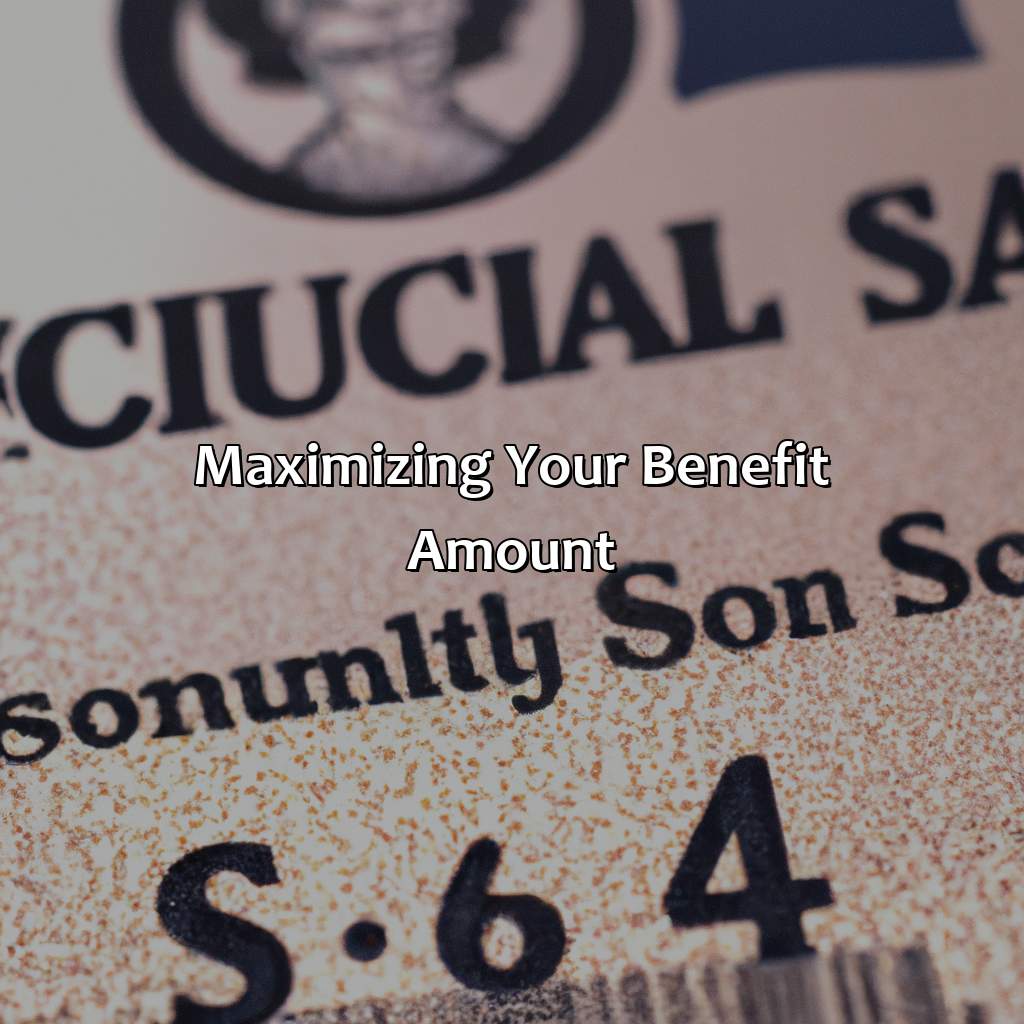What Is My Expected Social Security Benefit?
##Key Takeaway:
Key Takeaway:
- Eligibility Requirements: To qualify for Social Security benefits, you must have earned a minimum of 40 Social Security credits, which are earned based on the amount of money you contribute to the Social Security system through payroll taxes.
- Calculating Your Benefit: You can access your Social Security statement and understand your earnings record to estimate your expected benefit. Additionally, utilizing online benefit calculators can help you to accurately estimate your expected benefit.
- Maximizing Your Benefit: By delaying your claim, coordinating benefits with a spouse, and continuing to work while receiving benefits, you can increase your benefit amount. Consider your options carefully to maximize your benefit amount according to your needs.
Are you unsure about how much Social Security you can expect to receive upon retirement? In this blog, we’ll explain what factors you should consider when determining your estimated Social Security benefit. You’ll be better prepared to make smart decisions for your future.
Social Security Benefits Overview
As an American citizen, you might be curious about your future Social Security benefits. Learn about the benefits program, eligibility criteria, and payment amounts in this informative piece.
Social Security benefits are calculated based on your average monthly earnings. Benefit payments are computed using a formula that considers the highest-earning 35 years of your career. Age of receipt, retirement age, and disability, among other factors, are taken into account to determine your payment amount.
One unique aspect of Social Security benefits is its spousal benefit feature. Spouses (including divorced spouses and widows/widowers) may be eligible to receive up to 50% of their partner’s benefit amount. The amount depends on specific circumstances, such as age, the duration of the marriage, and current marital status.
The Social Security Administration projects that by 2035, there will be a 20% shortfall in funds to pay program recipients. (source: SSA.gov)

Image credits: retiregenz.com by James Arnold
How to Calculate Your Expected Benefit
In order to determine your estimated social security benefit, it is important to understand the process for calculating this figure. Here is a simple 6-step guide that can help you calculate your expected social security benefit:
- Obtain a copy of your Social Security statement: To get an estimate of your monthly benefit, it is recommended that you check your Social Security statement. This statement provides detailed information about your work history and projected benefit amount.
- Consider your work history: In order to qualify for social security benefits, you need to have earned a certain number of credits. Your benefit depends on how much you pay into the system, so the more you earn, the higher your benefit will be.
- Determine your full retirement age (FRA): Full retirement age is the age at which you can receive 100% of your Social Security benefits. The FRA is based on your birth year and can range from 66 to 67 years old.
- Calculate your benefit based on your FRA: Your benefit amount is based on your highest 35 years of earnings. You can use the Social Security Administration’s online calculator to estimate your benefit amount based on your historical earnings.
- Adjust for early or late retirement: If you retire before your FRA, your benefit amount will be reduced. Conversely, if you choose to delay retirement, your benefit amount will increase.
- Factor in inflation: Your benefit amount will be adjusted annually based on the Consumer Price Index (CPI). This helps to ensure that your benefit amount keeps up with the rising cost of living.
It is important to note that certain circumstances, such as disability or spousal benefits, can affect your estimated benefit amount. It is best to consult with a financial advisor or Social Security representative for an accurate estimate.
It is worth noting that the amount of social security benefits has been a topic of debate and change throughout history. The program was established in 1935 as a safety net for retired workers, and has since expanded to include disability and survivor benefits. However, concerns about the solvency of the program have led to changes in eligibility requirements and formulas for calculating benefit amounts over the years.

Image credits: retiregenz.com by Adam Duncun
Maximizing Your Benefit Amount
Maximizing Your Social Security Benefit
Did you know that you could increase your social security benefit amount by making the right choices? By deciding to delay your social security income and waiting until full retirement age, you could gain a more significant amount of monthly income and secure a better future. Also, taking into consideration your work history and projected earnings can help you ensure that you receive the maximum social security benefit amount.
Understanding Your Benefit Calculation
Additionally, calculating your social security benefit can be tricky. The Social Security Administration considers various factors like age, work history, and lifetime earnings when determining the amount of your benefit. A slight difference in any of these factors can affect your eventual payout.
Making the Right Choices
It is essential to make the right social security benefit choices by carefully examining your options. Investing time in understanding your situation and seeking professional advice can help you make informed decisions that could increase your social security benefit payout. Remember, making the right decisions could mean the difference between a comfortable retirement and a challenging one.
Don’t Miss Out – Take Action Now
You can take action now to increase your social security benefit. Familiarize yourself with social security rules and regulations, and seek professional advice if needed. By doing so, you can be confident that you are making informed decisions towards securing a financially stable future.

Image credits: retiregenz.com by Joel Arnold
Applying for Social Security Benefits
Applying for Social Security Benefits Explained
To apply for Social Security benefits, you must meet specific eligibility requirements. These include being at least 62 years old and having worked for at least ten years. You can apply online, by phone, or in person at your local Social Security office. Once your application is processed, you will receive a statement outlining your expected benefit amount.
To maximize your benefits, it is essential to understand the factors that affect them, such as your earnings history, retirement age, and claiming strategy. For instance, the longer you wait to claim benefits, the higher your monthly payments will be. It is also worth noting that Social Security benefits are taxable, and you may wish to factor this into your retirement planning.
Pro Tip: Consider working with a financial advisor or Social Security specialist to optimize your benefit amount and retirement income.

Image credits: retiregenz.com by Joel Duncun
Five Facts About Social Security Benefits:
- ✅ Social Security benefits are a source of retirement income for millions of Americans. (Source: AARP)
- ✅ Your expected Social Security benefit is calculated based on your lifetime earnings and the age at which you start receiving benefits. (Source: Social Security Administration)
- ✅ The full retirement age to receive 100% of your Social Security benefits is currently 66 or 67, depending on the year you were born. (Source: AARP)
- ✅ You can choose to start receiving Social Security benefits as early as age 62, but the amount you receive will be reduced. (Source: Social Security Administration)
- ✅ Delaying your Social Security benefits can increase the amount you receive each month and potentially maximize your lifetime benefits. (Source: CNBC)
FAQs about What Is My Expected Social Security Benefit?
What is my expected social security benefit?
Your expected social security benefit is the monthly amount you will receive from the Social Security Administration (SSA) based on your earnings record and retirement age. You can get an estimate of your benefit by creating a my Social Security account on the SSA website.
How is my expected social security benefit calculated?
Your expected social security benefit is calculated using a formula that takes into account your highest 35 years of earnings, adjusted for inflation, and your age at the time you start collecting benefits. The formula is then applied to your earnings record to determine your monthly benefit amount.
When can I start collecting my expected social security benefit?
You can start collecting your expected social security benefit as early as age 62, but your benefit amount will be reduced if you start before your full retirement age (which varies based on your birth year). You can also choose to delay collecting your benefit until age 70, which will increase your benefit amount.
What happens to my expected social security benefit if I continue working?
Your expected social security benefit may be affected if you continue working after you start collecting benefits. If you are under full retirement age, your benefit amount will be reduced if you earn over a certain limit. Once you reach full retirement age, your benefit will not be reduced no matter how much you earn.
What happens to my expected social security benefit if I die before collecting benefits?
If you die before collecting benefits, your spouse or dependents may be eligible to receive survivors benefits based on your earnings record. The amount they receive will depend on your earnings and their relationship to you.
Can I receive social security benefits from a previous spouse?
If you were married for at least 10 years and are currently unmarried, you may be eligible to receive social security benefits based on your ex-spouse’s earnings record. The amount you receive will depend on your ex-spouse’s earnings and your age at the time you start collecting benefits.


